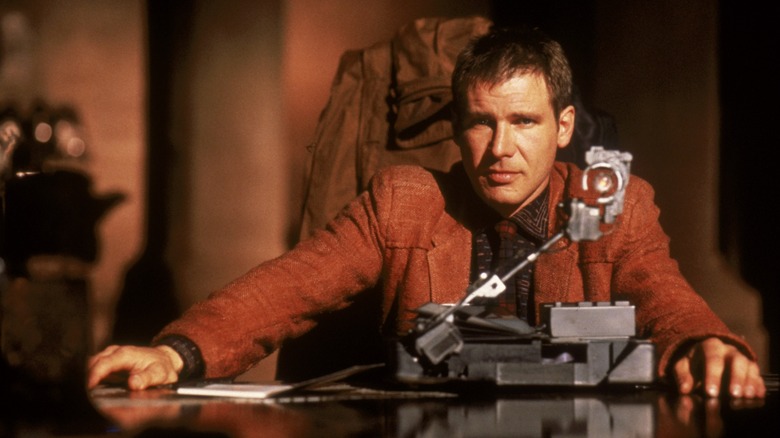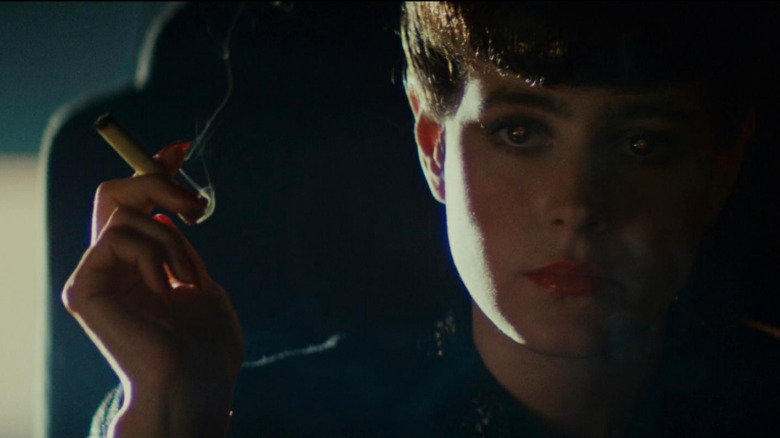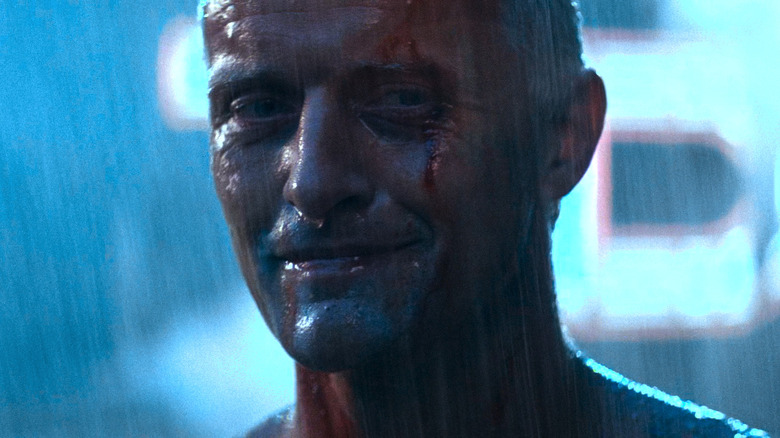Ridley Scott Carefully Avoided Answering Blade Runner's Biggest Replicant Question
In the decades after it was released, "Blade Runner" was dissected by fans and critics alike. People poured over its grim vision of the future, enraptured by the sci-fi glimpse it gave of a 2019 Los Angeles that was unlike anything anyone had ever seen. But it wasn't just the film's aesthetic atmospherics that had people enthralled. "Blade Runner" centers around the story of Rick Deckard (Harrison Ford), who works as one of many bounty hunters of bioengineered humans known as "replicants." Although, it's the film's group of replicants — led by Roy Batty (Rutger Hauer) and first presented as ruthless antagonists — that emerges as its Promethean heroes.
But even though "Blade Runner" deals greatly with replicants, much like its treatment of this uncanny dystopia, it steers clear of giving audiences more clarity than they need. It's the ambiguity surrounding the replicants that makes them so terrifying and fascinating. For director Ridley Scott, adapting the novel "Do Androids Dream of Electric Sheep?" meant setting up parameters for his movie. And one such barrier for "Blade Runner" meant excluding certain questions and answers about the replicants themselves.
Scott decided to cool it with the genetic science
After its dismal theatrical release, "Blade Runner" had a renaissance in the '90s catalyzed by the release of Ridley Scott's director's cut and with no small help from its VHS release. Fans could now rewind and rewatch a film that tested poorly by audiences for being too confusing. Obsessive theories about the film's ambiguities surfaced over the decades. Since then, sequel "Blade Runner 2049" has answered some questions, but one area where Scott wanted to be particularly vague was the process of genetic engineering that created the replicants. He told American Cinema Papers in 1982:
"We deliberately stopped, in screenplay development, going too far into the idea of genetic engineering, which we could have done. That would have been another, entirely different film. It would have been '2001,' in a way. In fact, to go into the study of genetics and its future is fascinating. But it was another can of beans. "
Seeing as how audiences screened for the film found bewildering, that was probably a good call. Scott continued:
"So we drew a line: We wouldn't explore the laboratory details, the genetic explanations. Instead, we'd ask: What if large combines in the next few decades became almost as powerful as the government? Which is possible. They'd move into all sorts of industries — arms, chemicals, aerospace — and eventually, they'd go into genetics. And then you reach the point where genetics starts developing into the first 'man-made' man. I think it could happen in the next 12 or 15 years."
The Tyrell Corporation was famously responsible for creating replicants. It's from CEO Dr. Eldon Tyrell (Joe Turkel) that audiences learn of the four-year lifespan limit to newer Nexus-6 replicants, and that it's irreversible. It's a revelation that ends in his gruesome murder by a vengeful Batty, but also points to Scott's focus for "Blade Runner." The problem faced by the replicants has less to do with their genetics than the age-old conflict between parents and their begotten children — especially when those children are treated as subhuman slaves.
Greater focus on the replicant struggle
Although Batty and his group strike out a bloody rampage against their creators, by the film's end the replicants have ceased to be the antagonists they were made out to be. Even when Batty crushes the skull of his pseudo-father, Tyrell, it's hard to feel bad for the guy. In not focusing on the genetic science behind the replicants, Ridley Scott decided to look at the consequences of breeding a workforce. He continued to American Cinema Papers:
"From there, as happens in 'Blade Runner,' you can quite easily slip into breeding a second-class generation to do things which normally you or I wouldn't care to do, or psychologically couldn't stand to do. For instance, going into space knowing you're not going to come back. You take a humanoid and dick around with his brain, bring him along certain psychological lines, and he's going to go quite happily."
The film's eternally famous "tears in the rain" monologue by Rutger Hauer comes to mind. After saving Deckard, Batty tells him, "I've seen things you people wouldn't believe." Batty waxes poetically about seeing "attack ships on fire ... bright as magnesium" near Orion, about riding on the decks of something called a "blinker," and watching "C-beams glitter in the dark near the Tanhauser Gate." In just a few sentences Batty paints a dazzling portrait of the wonder and terror he's witnessed living in the liminal spaces of the cosmos mankind has begun to colonize. It's the kind of effect the limitations of his own existence as a Nexus-6 replicant has on his psyche in contrast with the near limitless marvels of his reality as frontiersman of the universe. Rightfully, Scott hones in on the corporations that energize, manifest, and justify such horrendous practices — not to mention those made culpable in their complicity, like Deckard.


